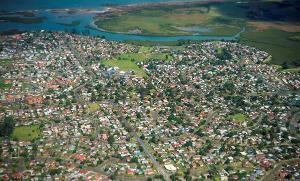
by Miriam Bell

The Super City’s average sale price in August was $821,079, which was a decline of 0.8% on July’s average price of $827,359.
This price was also below the average price for the past three months which was $825,327 – indicating August’s average price was below those recorded in June and May.
Barfoot & Thompson’s median price shows a similar trend.
August’s median price was $755,000 which is $2,000, or 0.3%, lower than that of July and $9,000, or 1.2%, than the median price for the last three months.
Barfoot & Thompson managing director Peter Thompson said there were signs that the rate of price increase was cooling in June and July.
“August’s figures have confirmed that winter has contributed to prices declining.”
Thompson, who noted that prices were stalling last month, said the market has reached the crossroads in terms of where prices go.
Given the factors leading to recent record prices – like high demand, a shortage of supply and low mortgage rates – are still in place, the traditional Spring pick up might lead to a return of price pressure.
However, Thompson said the new Reserve Bank and Government rules and regulations, combined with concerns about global economic stability, could keep a lid on Auckland price increases.
“The most likely scenario is that prices will increase modestly in coming months from where they are at present.”
Thompson also said that, while August’s average price is 15.4% higher than the average price in August 2015, making a year-on-year comparison was misleading.
“This is because it infers prices are continuing to rise, when they are not. Most of the increase that has occurred year-on-year did so in the first four months of the year.”
Applying year-on-year price comparisons over the next quarter also requires care, as last year sales patterns were interrupted by the run in to the 2014 general election, he added.
Barfoot & Thompson’s data also showed that the number of sales was down in August, as compared to July, and that there was a significant increase in new listings.
While Barfoot & Thompson’s data shows a decline in Auckland’s price, it is not a given that the agency’s data means housing prices are definitely falling.
This is because the latest QV data showed there was a 5.6% increase in Auckland residential property values over the last three months.
Also, Realestate.co.nz’s latest data showed that asking prices for Auckland property went up by 2.9% in August.
However, last month its data showed that Auckland asking prices were down by 1.4% – the most significant decrease since October 2014.
Westpac chief economist Dominick Stephens said QV’s data did not contradict observations of a price slowdown in Auckland.
This is because QV data refers to the date upon which a house changes ownership, while other data sources reflect the price struck when sales agreements go unconditional – which means the QV data is two months behind other data sources.
Stephens said Auckland is experiencing frenetic sales activity, but a slowdown in the rate of price inflation.
| « NZ ranked 5th in global house price index | Auckland house prices unsustainable: RBNZ » |
Special Offers
No comments yet
Sign In to add your comment

© Copyright 1997-2026 Tarawera Publishing Ltd. All Rights Reserved